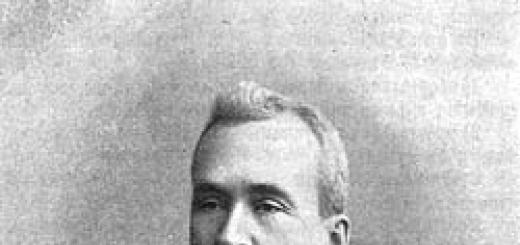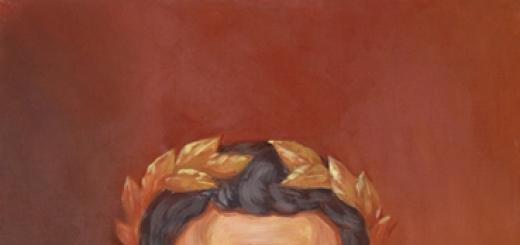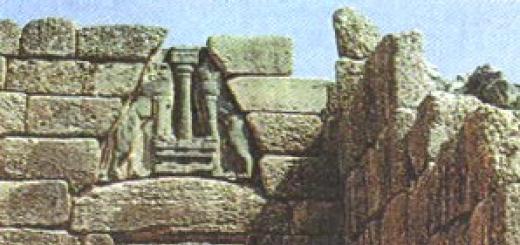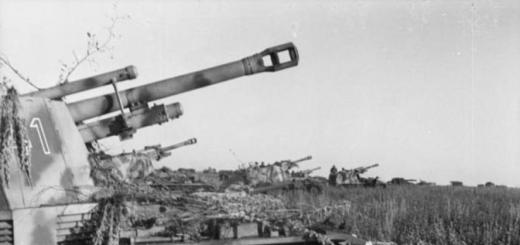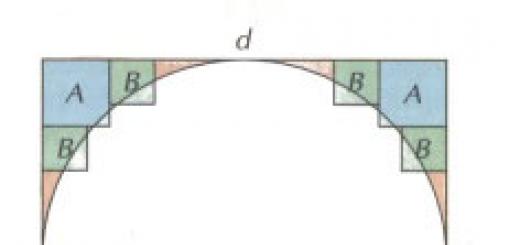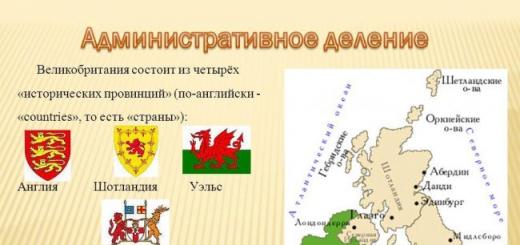Key year:
Marcus Junius (son) BRUTUS
Roman senator and general known as an assassin Caesar. Brutus was the son Mark of Junius Brutus and stepsister Cato of Utica , Servilia. Considered a descendant Lucius Junius Bruta who expelled the last Roman king - Tarquinia the Proud. Opinions often differ on this issue. Some believe that the first consul Brutus was a patrician, and Caesar's killer belonged to a plebeian family, presumably descended from one of the freedmen (just as the plebeian family of the Claudii descended from a freedman of the Claudian patricians). Brutus was adopted by his mother's brother, Quintius Servilius Caepio, and therefore received his name. He was married for the second time to Portia, daughter Cato of Utica. However, there is another opinion regarding paternal ancestry. It is believed that Brutus’s ill-wishers, who were angry with him for the murder of Caesar, argued that, apart from his name, he had nothing in common with Brutus, who expelled the Tarquins, for, having killed his sons, that Brutus remained childless, and that the house of Caesar’s murderer was plebeian, and rose to senior positions only recently. However, the philosopher Posidonius says that only two adult sons of Brutus were executed, but there was still a third, very small, from whom the whole family descended. According to Posidonius, in his time there were several prominent people from this house who showed a clear resemblance to the image that stood on the Capitol. In 59 BC. e. Brutus was falsely accused of plotting against Pompey, but Caesar, who by then had become his mother's lover, saw to it that the charges were dropped. Brutus was at first an opponent of Pompey, who killed his father in Gaul, but then sided with him when Pompey defended the cause of the optimates (aristocratic faction) in the civil war. However, after Caesar defeated Pompey at the Battle of Pharsalus (48 BC), Brutus defected to Caesar, who received him in a friendly manner and gave him the title in 46 BC. e. in the administration of Cisalpine Gaul. In 44 BC. e. Brutus became praetor, after which he was to gain control of Macedonia and even become consul. And yet he became the head of the conspiracy against Caesar. He received anonymous demands from various sides, reminding him of his origins from Brutus, the liberator of Rome from royal power, and prompting him to break with Caesar. Finally, Gaius Cassius Longinus attracted him to my side. The example of Brutus then prompted many noble Romans to join the conspiracy against Caesar. But when Caesar was killed, Brutus and the conspirators failed to attract the people with them. Anthony, whose murder, together with Caesar, was prevented by Brutus himself, managed, by reading Caesar’s will to the people, which provided the people with very significant sums, to arouse rage and thirst for revenge on his murderers in the crowd. Then Brutus went to Athens and captured Macedonia. Hortensius, who had until then ruled Macedonia, joined him. Owning all of Greece and Macedonia, Brutus became the head of a strong army, with which he defeated in 43 BC. e. Guy Anthony, brother of the triumvir, and took him prisoner. Then he moved to Asia and united with the victorious Cassius, together with whom he received from the Senate supreme power over all the provinces in the East. In Rome, however, the triumvirs soon triumphed: Mark Antony, Octavian And Lepidus. All the conspirators were convicted, and an army was equipped against Brutus and Cassius. The latter moved back to Europe to repel the triumvirs. They crossed the Dardanelles and massed their army, 17 legions and 17,000 cavalry, on the plains of Philippi in Macedonia, where the triumvirs Antony and Octavian confronted them in the fall of 42 BC. e. In the first battle fought by Octavian, Brutus overpowered his troops; but Cassius was defeated by Antony and committed suicide. After about 20 days, Brutus was forced to yield to the demands of his army and give a second battle, in which he was completely defeated. With a few friends, he managed to escape death. Seeing, however, that his cause was irrevocably lost, he threw himself on his sword. Only a few fragments of Brutus' speeches have survived; on the contrary, his correspondence with Cicero The entire book has been preserved and comprises two books.
Aphorisms (9) Connections (34)
Marcus Junius Brutus* is one of the remarkable personalities in the history of the Roman Republic in the last decades of its existence. Times were difficult: foreign wars, slave uprisings, bloody feuds of the Civil War. All this weakened the political system of Rome, which had developed in other times and had long ceased to correspond to modern reality. From a city-state over the centuries, Rome grew into a huge power inhabited by different peoples. A new system of governing the state, its remote provinces, vassal kingdoms and border settlements of Roman soldiers was needed. The old aristocratic republic has outlived its usefulness. New forms were born in the throes of civil wars. The army became the only real force. Generals turned into prominent figures of power. Everything led to the establishment of a dictatorship. In the struggle for power, Julius Caesar rose above others, defeating his rivals. Caesar suppressed with an iron hand all resistance from the aristocratic elite of the republic - the optimates. At the same time, he flirted with the people, trying to distract them from politics, bribing them with shows, magnificent festivities, and various handouts.
During these years, the political activity of Marcus Brutus developed. The future defender of the republic and an ardent opponent of Caesar came from an old and famous family. His ancestor, the legendary Junius Brutus, according to legend, rebelled against King Tarquin the Proud and expelled him from Rome. The royal power was ended forever. Junius Brutus became consul of Rome
* The biography of Marcus Brutus was written based on an essay by B. M. Kogan in the book “Famous Romans” (M. 1964).
412
Republic (509 BC). In this post, he became famous for his willpower, courage and intransigence towards the enemies of the republic.
In the Brutus family, their glorious ancestors were deeply revered and hatred of tyranny was traditional.
The mother of Marcus Brutus, Servilia, also belonged to the most famous Roman family, famous for the famous people who stood in defense of the republic.
Marcus Junius Brutus received an excellent education. He studied Greek philosophers, literature, and spoke Greek as his native language. He composed poetry, ceremonial and judicial speeches and was an excellent orator.
As a young man, Brutus first took part in a campaign on the island of Cyprus, which then belonged to Egypt. The expedition was commanded by his uncle. Brutus spent three years on the island, getting accustomed to the affairs of government and gaining experience.
After Cyprus, Brutus went to the center of the then culture and education - Athens, where he continued to study Greek philosophers.
He soon took up the official post of quaestor in the Roman province of Cilicia (Asia Minor). According to the customs of that time, he was also involved in trading and usury. Among his debtors were the kings of the Asia Minor states. Brutus became a rich man, one of the wealthiest people in the republic.
When a new civil war began, the struggle between Caesar and Pompey, Brutus took part in it. No one doubted that Brutus would take Caesar's side. Indeed, at one time, on the orders of Pompey, Brutus’s father was killed. However, the personal always gave way to Brutus’s sense of justice and devotion to the republic. He considered Caesar the main danger to her. And Brutus takes the side of Pompey, seeing in him the leader and defender of the republican system. In Asia Minor, where he was sent by Pompey, Brutus gathered a legion, a significant fleet, a lot of weapons and money. He led his forces to Macedonia, where he linked up with Pompey's army.
Soon Caesar's army arrived. Both armies settled near the city of Farsala. Even before the battle, Brutus remained true to himself. In the camp, every free hour he read, reflected on what he read.
The Battle of Pharsalus ended in the defeat of Pompey, who fled with his few supporters to the sea. Brutus hid in the marsh reeds, and under the cover of darkness went to the city of Larissa (in Thessaly). From there he wrote a letter to Caesar. The winner was delighted with the letter. He favored Brutus and always hoped to win him over to his side. Before the Battle of Pharsalus, Caesar ordered the commanders of his legions not to kill Brutus, but to
413
put him alive if he surrenders voluntarily. If he shows resistance, let him go. Now Caesar called Brutus to him and not only forgave him, but accepted him as one of his closest friends. He talked with him a lot. Brutus convinced Caesar to pardon Cassius and many other prominent Pompeians.
Before sailing to Africa to fight the remnants of the Pompeians, Caesar appointed Brutus as ruler - legate - of Pre-Alpine Gaul, as the Romans called Northern Italy. Brutus did an excellent job with the affairs of government, gaining universal respect. He did not disgrace himself either by cruelty or robbery. Residents breathed freely, as if there had been no civil war.
Caesar, returning from Africa and traveling around Italy, was very pleased with Brutus's leadership. In gratitude, the increasingly powerful dictator helped Brutus obtain the most important and honorable of the praetorships, the so-called city praetorship.
414
Using Caesar's trust and love, Brutus could achieve an even higher position. He became the second person in the state. But he became increasingly wary of Caesar, listening to the voices of those who warned about the danger of the caresses of a tyrant threatening the republic. And Caesar’s power increased: for the fourth time he became a dictator, this time for life, for the fifth time he was elected consul, and constantly bore the title of emperor as the military leader of the Roman army.
He received the right to declare war and manage the treasury. He began to appear dressed in a purple toga, like kings.
Rumors soon spread that the following year (44 BC) Caesar would be offered the royal crown. Nobody was surprised by this.
But not everyone bowed to the dictator; there were many dissatisfied with Caesar. There were many supporters of preserving the oligarchic republic. There were also simply dissatisfied people, offended by Caesar and seeking revenge on him.
A conspiracy against the dictator began to mature. By the end of winter (45/44 BC) it began to take shape. The conspirators sought to attract Brutus to lead them.
Brutus hesitated for a long time; he still believed Caesar and did not notice that his patron had actually crushed the republic and established a military dictatorship, shamelessly using power in his own interests.
The conspirators awaited Brutus' decision. His participation would be the key to success; he would justify their cause in the eyes of the people. If Brutus remains on the sidelines, then the conspiracy will be dealt an irreparable blow. After all, everyone knows the honesty and justice of Brutus and his love of freedom. Many will follow such a person.
Brutus's friend in the praetorship, Cassius, who had separated from him for some time, approached him, put his hand on his shoulder and said confidentially:
- They say that they want to proclaim Caesar king. What will we do if the flatterers in the Senate offer Caesar the crown??
“I will not go to the Senate,” answered Brutus.
“What if,” Cassius asked again, “as praetors we are obliged to appear in the Senate?”
- Then I will defend freedom and the republic!
Cassius embraced Brutus and revealed to him the secret of the conspiracy. Brutus's hesitation was over. He wholeheartedly defended the republic against tyranny and led the conspiracy. The name of Brutus attracted new supporters. More than sixty senators joined the conspiracy.
The entire burden of preparing the performance fell on Brutus’s shoulders. In public, he still maintained equanimity, nothing of himself
415
Without giving it away, he led an ordinary life. But those close to him could not help but notice that he was hiding something, keeping some secret. First of all, his wife, the noble Portia, noticed this. She loved her husband dearly, Brutus’s torment could not escape her, and she realized that he was hatching some dangerous plan. She decided to prove to her husband that she was worthy of trust and was ready to walk next to him to the end. She decided to show her toughness. Having locked herself in the bedroom, Portia stabbed herself in the leg with a knife. Blood gushed out and she felt a sharp pain. Then she called Brutus.
“Brutus,” she said, “I entered your house as a wife to share all your joys and sorrows.” I want to share everything with you. I am capable of keeping any secret. Have you forgotten that I am the daughter of Cato and the husband of Brutus?
With these words, she threw back the blanket, showed the wound on her thigh and said that in this way she decided to test her toughness.
Brutus hugged her and blessed the gods that he had received such a wife and friend. He became even more strengthened in his goals and determination to act.
The conspirators decided to kill Caesar in the Senate on the day of the Ides of March, that is, in mid-March, when the senators gathered for a meeting. They said that at this meeting Caesar would be proclaimed king. On such a day it was possible to get together without arousing suspicion.
When the appointed day arrived, Brutus and the other conspirators, hiding short swords under their toga, went to the Senate. Brutus was amazingly calm.
Caesar was a little late. The conspirators began to fear that he had learned something and took precautions. But soon a stretcher appeared, carried by six tall slaves. They placed the stretcher on the ground, Caesar got out of it and went to his chair. The senators greeted the dictator standing.
The conspirators, led by Brutus, divided into two groups, one stood behind Caesar’s chair, the other came out to meet him. One of the conspirators turned to Caesar with a request to forgive his brother, who had recently been expelled from Rome. Caesar refused to pardon. But the petitioner did not leave, but together with others approached the chair even closer. The blades of short swords and daggers flashed. Blows rained down on the dictator.
Senators; numb, they looked at the bloody scene.
Caesar screamed and fought, trying to break through the circle of killers. Suddenly he saw Brutus with a sword in his hand.
- And you Brute! - exclaimed the amazed Caesar and stopped resisting. He wrapped his head in a toga and silently accepted the fatal blows. He received twenty-three wounds. He fell dead at the foot of the statue of Pompey that stood there. One might have thought that Pompey himself had come to take revenge on his enemy.
416
The senators fled in horror. The conspirators with bloody swords in their hands rushed into the streets of the city, shouting: “We have destroyed the king and the tyrant!”
They called for the restoration of the freedom trampled by Caesar.
Brutus and Cassius addressed the people at the forum. But the people of Rome were not on the side of Caesar's murderers. Many did not understand why the conspirators were afraid of new unrest.
The Senate did not agree to declare Caesar a tyrant and express gratitude to his murderers. At Cicero's suggestion, the Senate adopted a compromise decision: to leave all Caesar's laws in force and not to punish his murderers.
Caesar was given a magnificent state funeral. The dictator bequeathed seventy-five silver coins to each Roman and left his huge gardens beyond the Tiber to the people. Caesar's generosity changed the mood of the citizens, they praised the character of the deceased and expressed hostility towards his murderers. The crowd began to destroy the houses of the conspirators.
Brutus and his friends achieved nothing. They eliminated Caesar, but could not restore the republic. The Caesarians remained in power. They were led by Mark Antony, a military leader close to Caesar - brave, ardent, but indecisive. The second leader of the Caesarians was the chief of cavalry under Caesar, Marcus Aemilius Lepidus. The third was Caesar's young grandnephew Octavian. They formed a government known as the second triumvirate and shared power among themselves.
Brutus and his friends fled to Greece, preparing to fight. Brutus showed remarkable qualities as a commander and ruler. In a short time he gathered significant forces. Asia Minor, Syria, Greece were for him. Former soldiers and officers of Pompey flocked to him. The kings of Asia Minor delivered him weapons and money.
Just recently, Brutus and Cassius left Italy as fugitives, without money, without weapons, without a single ship, not a single city on their side. And a few months later they had a well-equipped fleet, infantry, cavalry, a rich treasury and vast territory in the east of the Roman state.
Despite the difference in character between the two Republican leaders, Brutus and Cassius, they got along well with each other. Cassius was harsh, even cruel to his subordinates and merciless to the enemy. Even his enemies respected Brutus for his straightforwardness, generosity, honesty and forbearance.
Cassius captured the island of Rhodes, where he mercilessly dealt with those residents who opposed the Republicans. He said that mercy cannot be expected from someone who did not spare Caesar.
Brutus besieged the city of Xanthus (in Lycia), whose inhabitants preferred death by fire to surrender. Brutus rewarded those warriors
417
who saved townspeople from the fire. After this, another Lycian city, Patara, surrendered to Brutus without resistance.
Having conquered these cities, Brutus addressed the inhabitants of the island of Samos:
- The Xanthians, having rejected my merciful offers, turned their homeland into a grave, into ashes. The Patarians, trusting me, saved both life and freedom. Choose!
The Samians, having received this letter, worthy of the brevity of the ancient Spartans, surrendered to Brutus.
But Brutus could be cruel. In response to the execution of Cicero*, he ordered the execution of the captured brother of the triumvir, Gaius Antony. When Theodotus, the murderer of Pompey, fell into the hands of the Republicans, he was put to painful execution by order of Brutus.
Brutus and Cassius concentrated their forces in Macedonia, near the city of Philippi.
The triumvirs, preparing for the fight, also gathered an army to defeat the Republicans. Soon Mark Antony and Octavian led legions loyal to them into Macedonia. Their troops camped near the Republicans.
The enemy forces were approximately equal. Only Brutus and Cassius had more cavalry.
Both armies stood opposite each other in inaction. The Republicans did not want a decisive battle. They hoped that after cutting off the enemy's sources of supply, his troops would be forced to surrender.
However, Antony and Octavian managed to force a battle on the Republicans.
The opponents were separated by a vast swamp. Anthony decided to overcome it and go behind enemy lines. For show, Anthony reviewed his soldiers every day, and secretly some of the legionnaires built an embankment in the swamp to make it passable. Ten days later, the embankment was built, and the army moved along it, without unnecessary noise, at night. Cassius' forces were surrounded.
Cassius quickly retaliated: his soldiers built a wall across the swamp. Anthony's legions rushed to storm the wall. Thus began the battle of Philippi. When Anthony's right wing went to the rear, Cassius's cavalry, not thinking about resistance, began to retreat. Left without cover, the infantry also wavered. All attempts by Cassius to stop the warriors were unsuccessful. He had to retreat too. Enemies burst into the camp. At this time, Cassius' companions saw horsemen quickly approaching them. This was Brutus's vanguard, rushing to the rescue. But Cassius decided that this was an enemy pursuit. He was persuaded to send a man on reconnaissance. He was a certain Titinius, a close friend of Cassius. The horsemen recognized him and greeted him with joyful cries, many dismounted and hugged him. But this led to disaster. Cassius
*See biography of Marcus Tullius Cicero.
418
decided that Titinius had fallen into the hands of enemies. In despair, Cassius threw himself on his sword.
Having learned of Cassius's defeat, Brutus hurried to him, but found his friend already dead. Mourning his comrade-in-arms, Brutus said that he was the last Roman, for we will never see a man of such fortitude. Brutus encouraged Cassius' soldiers, promised each a reward and assured that final victory was near. After all, he managed to defeat Octavian. Brutus's warriors burst into the enemy camp, but they did not find Octavian there; he managed to get out of the camp fortifications.
The double mistake of the commanders turned out to be fatal for the Republicans: Brutus was sure that Cassius had won and therefore did not immediately come to his rescue, and Cassius believed that Brutus had died and therefore did not wait for his help.
Brutus set about rebuilding Cassius' camp. The Republican commander decided not to storm the enemy positions until all forces were gathered together. This decision was a mistake. Many of Cassius's commanders and warriors were unhappy that they were commanded by Brutus. Discipline in the Republican army fell, as did faith in victory.
The Republicans had many prisoners. They needed to be guarded, and there were no extra soldiers for this. Brutus decided to release those prisoners who were born free, and ordered the captured slaves to be slaughtered, because they were not considered people. He paid money to Cassius' soldiers. Then he promised the entire army to give two Greek cities - Thessalonica and Sparta - for plunder. These cruel and shameful acts were a stain on Brutus's good name, the only stain on Brutus's reputation that cannot be justified.
The situation was no better for the triumvirs. Food was running out. The camps were located in a lowland, in a swamp. Everyone looked forward to the winter cold with fear. To top off the troubles came the news of a defeat at sea: Brutus’s ships destroyed the ships that were carrying reinforcements and food.
When Antony and Octavian received this message, they decided to rush the battle, eager to finish the fight before Brutus learned of his sailors' victory.
On a cloudy November morning, the Republican army began to form into battle formation. They were waiting for the order to start the battle. But Brutus remained silent. It was as if he had been replaced. He hesitated and did not make a decision. Many Republicans defected to the enemy. Brutus stopped trusting even his friends. Only in the evening did he give the signal for battle. The army began to move. The Second Battle of Philippi began (November 42 BC). At first the battle went well for the Republicans. At the head of the left flank, Brutus led his soldiers towards the enemy. The enemy was crushed and became
419
retreat. But Brutus's right wing was too weakened. It could not withstand the enemy's blow and retreated. Brutus's army was surrounded and almost all were destroyed.
In this terrible hour, Brutus showed miracles of courage and skill as a commander; but it was no longer possible to turn the tide of the battle. His warriors fought differently than they once did, especially those who came to him from Cassius’s detachment. Many surrendered, but Brutus's best comrades fell, fighting to the end. Some of them tried to save Brutus. So, one of his friends, Lucilius, seeing that the enemy’s horsemen were rushing towards Brutus, rushed across, shouting that he was Brutus and that he was surrendering to the mercy of Antony. The overjoyed soldiers triumphantly took the imaginary Brutus to Antony's tent. Remaining calm, Lucilius said:
- Nobody captured Marcus Brutus and, I hope, never will. I deceived your soldiers and for this I am ready to endure any punishment.
Those present were both confused and amazed at the courage and composure of Lucilius. To their surprise, Anthony said:
- We have captured a prey that is better than what we were looking for. They were looking for an enemy, but they found a friend. I swear to the gods, I don’t know what I would have done with Brutus if I had caught him. And let people like this Lucilius always be Anthony’s friends and not enemies!
With these words, he hugged Lucilius, who remained devoted to him throughout his life.
Meanwhile, Brutus fled. He crossed a river, the banks of which were overgrown with dense forest. It was already dark when he stopped in a hollow at the foot of a high cliff. Brutus sat for a long time in deep thought. Then he began to loudly mourn the friends who had fallen defending him in battle. He called everyone by name, leaving no one out. He ordered all his companions to take care of salvation.
The quietest and darkest time of the night has arrived. Brutus leaned over to his devoted slave Clitus and whispered something to him. Cleitus did not answer and began to cry. Brutus called his squire Dardan and spoke with him face to face for quite a long time. Dardan was sullenly silent. Then Brutus turned to his friend Volumnius, recalled their long friendship and said:
- Now do me one last favor: I will take the sword, and you put your hand on top of mine to add strength to the blow.
Volumnius flatly refused. Then someone noticed that the enemy was approaching and they had to run. Brutus stood up.
“Yes, we must run,” he said, “but I will act not with my feet, but with my hands.”
He was completely calm. With a smile, he said goodbye to everyone in turn and thanked his friends for their loyalty. Finally, he again called on everyone to take care of saving lives and stepped aside.
420
Three followed him, including a Greek named Strato, an old friend of Brutus. Brutus ordered him to stand next to him, placed the hilt of his sword on the ground and, holding the sword with both hands, rushed at him. The tip pierced right through him. This is how the life of Marcus Junius Brutus ended.
Antony found the body of Brutus and gave it a solemn burial. Anthony ordered the urn with the ashes to be taken to Rome to his mother. Having learned of her husband's death, Brutus's wife Portia followed his example.
Brutus remained in history as a hero of the struggle for freedom and was preserved as such in the memory of peoples; she is still alive today *.
* Suffice it to recall Michelangelo’s sculpture “Brutus”, which was recently brought to Russia, and the mention of the name of this hero by A. S. Pushkin.
Prepared according to the edition:
Famous Greeks and Romans: 35 biographies of outstanding figures of Greece and Rome. Collection. Authors and compilers: M. N. Botvinnik and M. B. Rabinovich - St. Petersburg: Individual private enterprise of Kuznetsov “Publishing house “Epoch”, 1993. 448 p.ISBN 5-87594-034-4.
© M. N. Botvinnik and M. B. Rabinovich, authors of the arrangement, 1993
March 15, 44 BC The murder of the first person of the Roman state, Gaius Julius Caesar, occurred. In front of 800 senators, 60 conspirators rushed at the 56-year-old emperor and stabbed him with short swords. There are 23 wounds left on his body. The main conspirators were Marcus Brutus and Cassius Longinus.
The name Brutus in the mass consciousness is associated with the concept of “traitor.” Caesar is a man of remarkable abilities who manages to do many things at the same time. Of course, there is some truth in these “pop” characteristics. But I wanted to understand this “old criminal case” in more detail. The murder of the first person of the state in the Senate is an extraordinary event. And now there are scandals and fights in parliaments. However, there is no stabbing.
Historians and writers have always been attracted by the outstanding figure of Caesar - the winner, reformer, triumphant. Whose life was also cut short so tragically. Considering his intelligence and insight, a vulgar question comes to mind: “How could he allow this to happen?” Maybe biographical facts will provide the answer?
Citizens, you are free!
After reading several of his biographies, I came to the conclusion that he was a unique person in terms of concentration and speed of reaction. A politician who made virtually no mistakes.
This episode testifies to the strength of his character. At the age of twenty, Caesar was captured at sea by pirates. They demanded a ransom of 20 talents (the largest monetary unit of antiquity, equal to approximately 30 kilograms of silver). “You don’t know yet who you caught,” the victim said brazenly, “demand 50 talents.” Having sent his people to different cities for money, Julius and two servants remained captive among the invaders. He behaved with the robbers in a completely impudent manner: he ordered them not to make noise when he went to bed; wrote poetry (he became a talented writer, leaving behind two classic works: “Notes on the Gallic War” and “Notes on the Civil War”) and recited them to the bandits. If the creation did not evoke delight (it’s the same as now instead of Shufutinsky, criminals perform Grebenshchikov), he called the listeners ignoramuses and barbarians. And subsequently he promised to execute him. In response, the pirates laughed. Throughout the 38 days that he was with his captors, he behaved “as if they were his bodyguards, without fear he amused himself and joked with them” (Plutarch). When the said amount was collected and the hostages were released, Caesar immediately equipped the ships in pursuit. The pirates were so careless that they remained hanging around the island where the prisoners were kept. Petty-criminal psychology worked: go on a spree after the jackpot. Having captured the pirates, Caesar crucified most of them, as promised.
Maybe he was too cruel, which caused discontent among his subjects? But here are the facts that tell a different story.
Caesar's legionaries had been fighting for several years and were eager to go home. And then it was necessary to go to Africa to finish off the Pompeians, Caesar’s opponents in the civil war. The soldiers were tired and mutinous. They immediately demanded the promised rewards and land plots. They drove away the leaders who were sent to them. The situation became dangerous. Suddenly Caesar appeared in the camp. The soldiers were taken aback, but greeted him. "What would you like?" – the commander asked the soldiers who had lined up. - “Resignations! Resignation! – the veterans began chanting and hitting their shields with their swords. “So get it, citizens!” - Caesar said and went home. Then the incredible happened - several thousand adult men began to cry. From resentment.
The fact is that Caesar always called them “warriors” or “comrades-in-arms.” But since they themselves forcibly demanded resigning to civilian life, it means they became private individuals - citizens. And first of all, in his eyes.
The veterans immediately sent their commanders to ask for forgiveness, the thought was so intolerable to them that Caesar ceased to consider them comrades in arms. Caesar excused the grumbling soldiers.
Modern PR people and political strategists like to use this example to show how Julius skillfully manipulated his subordinates. Rare stupidity! Such gestures are not calculated. They are dictated by feeling. Caesar was actually offended for his legionnaires. It was this feeling that was transmitted to the soldiers and caused a strong response. Caesar and his army were one.
After the civil war, Julius not only pardoned the adherents of his opponent Pompey, but also gave them high positions. The same to Brutus and Cassius. (It would be the same if Stalin had not organized “Red Terror” against the former White Guards, but had appointed them to responsible positions in the commissariats). The grateful Romans wanted to dedicate the Temple of Mercy to Gaius Julius.
Maybe he didn't please the people?
But he was engaged in pleasing the people all his life (not forgetting, of course, about himself). He organized magnificent shows, developed, so to speak, show business, carried out judicial reform, and achieved benefits for veterans. He continued to care for the people even after his death. When Brutus announced at the forum that now there would be a republic again, that the tyrant had been killed, the crowd fell into quiet shock. But she wasn’t particularly upset or happy. And somehow... The people, as you know, are bastards.
When Mark Antony publicly opened Caesar's will, it turned out that he had left 750 drachmas (a very decent amount) to each Roman - the people struck a chord. Everyone started crying. “We lost our dear father, our breadwinner! You see, he threw in some money posthumously and took care of everyone. But you won’t get a penny from the Republicans!” And, having betrayed Caesar's body to the funeral fire, the crowd rushed to look for the killers. But they escaped in time. And their houses, of course, were burned. For order. (These events are reflected in detail in Shakespeare’s play “Julius Caesar,” which was made into a good Hollywood film with Marlon Brando in the role of Mark Antony.)
Gaius Julius possessed brilliant eloquence and artistic charm, which he skillfully used. He did not despise people as such (like, for example, his outstanding predecessor, dictator Sulla), which helped him remain sincere in difficult situations, and sometimes come out of them with humor. One day, Julius grabbed the standard bearer who was running from the battlefield by the shoulders, turned him around and, pointing in the opposite direction, said: “The enemy is there.” His words spread through the ranks of the soldiers and raised their morale.
And in peacetime, Caesar did a lot of useful things. I even got to the calendar. Otherwise, among the priests, with their “intercalary month,” the harvest festival no longer fell in the summer, and the grape harvest festival did not fall in the fall. The month in which Caesar's birthday fell (July 12), the Senate out of fawning named him after him.

Bestial Justice
But if Caesar was so good, why was he treated so mercilessly? Let's look at the key figure of the conspiracy - Brutus. And in general in the historical situation at that time.
At first, Rome was ruled by kings. However, Tarquin the Proud annoyed everyone so much with his unprecedented harshness that in 509 BC. an uprising broke out. It was headed by Junius Brutus, the distant ancestor of Marcus Brutus. Having expelled the tyrant, Junius proclaimed that from now on he was transferring power to the Senate and the people. The Tsarist era ended, and the republican form of government began (republic translated from Latin as “common cause”).
However, as the Roman state grew, the republican form began to slip; it was necessary to control too much territory. Without a firm hand, chaos ensued: robberies, banditry and uprisings. Historically, things were moving toward empire. And Caesar became the first link in this socio-political transition: he received the honorary title of “emperor,” and his nephew Octavian Augustus became “emperor in law” (and the Senate named the month after July in honor of his nephew).
Many in the leadership were dissatisfied with Julius out of envy. Others wanted a return to republican rule. Although Caesar opposed royal privileges, he concentrated power in his own hands. I must say, very skillful.
Young Brutus was a republican. He, as they say, was from the breed of “fighters for justice.” Such people are extremely dangerous because, paradoxically, they place justice above morality. Such principles often lead to a lot of bloodshed. In this row are Robespierre and Lenin. If justice is not based on an internal moral law, it quickly becomes a tool in the hands of executioners, since it is subordinated to the interests of only one social group or to utopian ideas, such as serving an abstract “people”.
Metaphysically, there are two antagonistic justices: divine and diabolical. The first comes from love and heart, the second - from selfishness and calculation. Formally, Caesar is a tyrant, which means death to him, since tyrants are enemies of the Republic. Shakespeare put the main conclusion from this situation into Antony’s mouth: “O justice! You are in the chest of an animal, people have lost their minds. Sorry; Caesar's heart went to the grave. Let me wait for it to return."
But let's return to the personality of the main conspirator. When civil war broke out between Caesar and Pompey, Brutus took the latter's side. Caesar, however, favored Brutus in every possible way - they had fought together before.
After Pompey's army was defeated, his legions went over to Caesar's side. Pompey fled. Brutus wrote a letter of confession to Julius. He was delighted. They met. Caesar asked Brutus if he knew where Pompey had taken refuge? Brutus pointed out that Pompey fled to Egypt. Strong principles in him coexisted with a weak character. Which made it possible to justify any betrayal.
In response to a Roman request for Pompey, the Egyptians sent his head. They had already learned that Pompey had lost. And they vilely killed him. Seeing the head of his enemy, Caesar began to cry - he respected Pompey as a worthy opponent. Julius ordered the execution of amateur executioners.
Caesar's power continued to strengthen. He has already become a dictator for life. There was relative peace and prosperity in the state. But everyone can never be happy. The same Cassius believed that he received fewer favors from Caesar than Brutus. He began to incite the latter into a conspiracy. I remembered his revolutionary ancestor. Like, are you a real Brutus or a rag? Brutus' weak character contributed to the fact that the suggestion worked. He began to see himself in the role of a “fighter against tyranny.”
When Caesar was informed of the nascent conspiracy and that Brutus was at its head, he pointed to himself and said: “He can calmly wait until this body dies itself.” Hinting that after his death Brutus will automatically receive the power of the first person in the country. Where should he rush? But Brutus did not wait.
Without resistance
Here is a detailed description of the murder of Caesar (when the crime has more than half a thousand witnesses, it can be reconstructed with documentary accuracy).
“When Caesar entered, the senate rose from their seats as a sign of respect. The conspirators, led by Brutus, divided into two parts: some stood behind Caesar’s chair, others came forward to ask for his exiled brother together with Tullius Cimbri; With these requests, the conspirators accompanied Caesar to his very chair. Caesar, sitting in a chair, rejected their requests, and when the conspirators approached him with even more persistent requests, he expressed his displeasure to each of them. Then Tullius grabbed Caesar's toga with both hands and began to pull it off his neck, which was a sign of an attack. Casca was the first to strike with his sword in the shoulder; this wound, however, was shallow and not fatal. Casca, apparently, was at first embarrassed by the audacity of his terrible act. Caesar turned, grabbed the hilt and held the sword. Almost simultaneously, both shouted - the wounded Caesar in Latin: “Scoundrel, Casca, what are you doing?”, and Casca in Greek, turning to his brother: “Brother, help!” (Plutarch).
The conspirator Casca was more frightened than the victim: he called his brother for help. Conventionally, the situation can be called “a tiger surrounded by jackals.”
“The senators who were not privy to the conspiracy, struck by fear, did not dare to run, nor to defend Caesar, nor even to scream. All the conspirators, ready to kill, surrounded Caesar with drawn swords: wherever he turned his gaze, he, like a wild beast surrounded by hunters, met the blows of swords aimed at his face and eyes, since it was agreed that all the conspirators would accept participation in the murder and, as it were, taste the sacrificial blood. Fighting off the conspirators, Caesar rushed about and screamed, but when he saw Brutus with a drawn sword, he threw a toga over his head and exposed himself to blows. Many conspirators injured each other, directing so many blows to one body. After the murder of Caesar, Brutus stepped forward, as if wanting to say something about what had been done, but the senators, unable to bear it, rushed to run, spreading confusion and fear among the people” (Plutarch).
Regarding Caesar, Plutarch revealed one contradictory detail: why did Caesar, seeing Brutus with a sword, throw a toga over his head and stop resisting?
When I asked friends in the humanities (including historians) if they could explain Julius’s reaction, they said that he was struck by his friend’s betrayal.
Just think! In the life of Caesar, a man who won seven major battles and became the dictator of Rome, there were a lot of betrayals. As you know, betrayal is a normal component of political life. As Gaft’s hero said in the film “Garage”: “To betray in time is not to betray, it is to foresee.” This act, of course, does not become any less disgusting, but it can hardly surprise a seasoned politician.
When an ordinary person is betrayed, what is his reaction? That's right - he will get angry. And he will even become furious. Moreover, Caesar, an extraordinary man, would have done this. No wonder Casca was scared! Caesar, as a professional warrior, could well have snatched the sword from him (or from another conspirator) (especially since he was already holding the weapon by the hilt) and tried to escape from the Senate building. During the war, he got into troubles no less dangerous hundreds of times. Moreover, the conspirators interfered with each other, and it was possible to take advantage of the confusion. They say that of all the blows, only one was fatal. Finally, Julius could have died fighting. But no - he defiantly threw his clothes over his head and gave himself up to be torn to pieces. This act did not go well with Caesar’s nature. What's the matter? There was no answer in numerous historical reference books and encyclopedias.
I delved into the detailed biography of Brutus by the same Plutarch. The answer turned out to be obvious: “Caesar was very worried about Brutus and asked the commanders not to kill him in battle, but to spare him in every possible way and bring him to him if he agreed to surrender voluntarily, and in case of resistance on his part, to leave him alone. He did this to please Brutus' mother, Servilia. Apparently, while still a young man, he was in a close relationship with Servilia, who loved him madly. And since at the very time when their love was in full swing, Brutus was born, Caesar was almost sure that Brutus was born from him.”
Brutus was Caesar's illegitimate son! To verify this, let’s take a closer look at the images of one and the other. The similarity between the profiles of Brutus and Caesar is immediately noticeable. Everything fell into place.

And you…
Let's imagine the same situation again.
After Casca's first blow, Caesar naturally became furious. And turning, he grabbed the hilt of the sword. Julius immediately realized that this was an assassination attempt and began to act. In all battles (both on the battlefield and in oratorical battles), his instant reaction saved him. Frightened, the helmet calls his brother for help. The conspirators attack en masse, but due to crowding, they inflict more wounds on each other than on their victims.
What does a tiger do when surrounded by jackals: getting ready to jump. Caesar, screaming, tries to break through the ring of enemies. And at that moment he suddenly sees his own son with a sword in his hands. The son whom he took care of reverently. This was probably the only time that everything broke inside Caesar. The phrase “And you, Brutus,” which has become sacramental, means that if his son went against him, life simply loses its meaning. This powerful man throws clothes over his head and allows himself to be killed without resistance. Brutus, in the name of not too clear political ideals for him, which he formally followed, raised his hand against his father.
Fate decreed that everyone who participated in this crime subsequently died.
Cassius and Brutus met for a decisive battle near Philippi with Caesar's nephew Octavian, who vowed to avenge his uncle, and Caesar's friend Antony.
The killers were haunted by fatal bad luck. Twice on the eve of the battle an ominous ghost appeared to Brutus. Although the senator was not a mystical person, he considered this a bad omen.
Cassius, mistakenly (his eyesight weakened with age) mistaking Brutus' horsemen from afar for Antony's soldiers, committed suicide, and with the same sword with which he killed Caesar.
Brutus, having lost his comrade-in-arms, completely lost heart and lost the battle of Philippi.
He took refuge with his friends in the forest and said, saying goodbye, that “he considers himself happier than the victors, since he leaves behind the glory of virtue.” He was wrong in his forecast. Truly, the road paved with good intentions leads to only one address.
Brutus spoke his last words with the composure characteristic of his great parent. And then he rushed at the sword, which was set up by one of his friends.
Thus ended one of the most tragic confrontations that can happen between father and son and between man and man.
Who expelled the last Roman king - Tarquinius the Proud. Opinions often differ on this issue. Some believe that the first consul Brutus was a patrician, and Caesar's killer belonged to a plebeian family, presumably descended from one of the freedmen (just as the plebeian family of the Claudii descended from a freedman of the Claudian patricians). Brutus was adopted by his mother's brother, Quintius Servilius Caepio, and therefore received his name. He was married for the second time to Portia, daughter of Cato Uticus. However, there is another opinion regarding paternal ancestry. It is believed that Brutus’s ill-wishers, who were angry with him for the murder of Caesar, argued that, apart from his name, he had nothing in common with Brutus, who expelled the Tarquins, for, having killed his sons, that Brutus remained childless, and that the house of Caesar’s murderer was plebeian, and rose to senior positions only recently. However, the philosopher Posidonius says that only two adult sons of Brutus were executed, as we are told about this, but there was still a third, very small, from whom the whole family descended. According to Posidonius, in his time there were several prominent people from this house who showed a clear resemblance to the image that stood on the Capitol.
Political activity
In 59 BC e. Brutus was falsely accused of plotting against Pompey, but Caesar, by then the lover of Brutus' mother, saw to it that the charges were dropped. Brutus was at first an opponent of Pompey, who killed his father in Gaul, but then sided with him when Pompey defended the cause of the optimates (aristocratic faction) in the civil war. However, after Caesar defeated Pompey at the Battle of Pharsalus (48 BC), Brutus switched sides to Caesar, who received him in a friendly manner and gave him the title in 46 BC. e. in the administration of Cisalpine Gaul. In 44 BC e. Brutus became praetor, after which he was to gain control of Macedonia and even become consul.
Assassination of Caesar
And yet Brutus became the head of the conspiracy against Caesar. He received anonymous demands from various sides, reminding him of his origins from Brutus, the liberator of Rome from royal power, and prompting him to break with Caesar. Finally, Gaius Cassius Longinus attracted him to his side. The example of Brutus then prompted many noble Romans to join the conspiracy against Caesar.
But when Caesar was killed on March 15, 44 BC. e., Brutus and the conspirators failed to captivate the people. Anthony, whose murder, together with Caesar, was prevented by Brutus himself, managed, by reading Caesar's will to the people, which provided the people with very significant sums, to arouse rage in the crowd and a thirst for revenge on his murderers.
Fighting against the triumvirs and death
Then Brutus went to Athens and captured Macedonia. Hortensius, who had until then ruled Macedonia, joined him. Owning all of Greece and Macedonia, Brutus became the head of a strong army, with which he defeated in 43 BC. e. Guy Anthony, brother of the triumvir, and took him prisoner. Then he moved to Asia and united with the victorious Cassius, together with whom he received from the Senate supreme power over all the provinces in the East.
In Rome, however, the triumvirs soon triumphed: Mark Antony, Octavian and Lepidus. All the conspirators were convicted, and an army was equipped against Brutus and Cassius. The latter moved back to Europe to repel the triumvirs. They crossed the Dardanelles and massed their army, 17 legions and 17,000 cavalry, on the plains of Philippi in Macedonia, where the triumvirs Antony and Octavian encountered them in the fall of 42 BC. e. In the first battle fought by Octavian, Brutus overpowered his troops; but Cassius was defeated by Antony and committed suicide. After about 20 days, Brutus was forced to yield to the demands of his army and give a second battle, in which he was completely defeated. With a few friends, he managed to escape death. Seeing, however, that his cause was irrevocably lost, he threw himself on his sword.
Essays
Only a few fragments of Brutus' speeches have survived; On the contrary, his entire correspondence with Cicero has been preserved and amounts to two books.
The authenticity of individual letters, however, was disputed, namely by Tanstall (Cambr., 1741 and Lond., 1744), Zumpt (Berlin, 1845) and Meyer (Stuttg., 1881); The defenders of their authenticity were: Middleton (London, 1743), Hermann (Gött., 1844-45), Kobe (in “Mnemosyne”, 1879), Gaston Boissier (“Cic?ron et ses amis”, Paris, 1865; 7 ed., 1884).
Philippi, Macedonia
Family
Brutus was the son of Marcus Junius Brutus and Cato Uticus' half-sister, Servilia. Considered a descendant of Lucius Junius Brutus, who expelled the last Roman king, Tarquinius the Proud. Opinions often differ on this issue. Some believe that the first consul Brutus was a patrician, and Caesar's murderer belonged to a plebeian family, presumably descended from one of the freedmen (just as the plebeian Claudian family descended from a freedman of the Claudian patricians). Brutus was adopted by his mother's brother, Quintus Servilius Caepio, and therefore received his name. He was married for the second time to Portia, daughter of Cato Uticus. However, there is another opinion regarding paternal ancestry. It is believed that Brutus’s ill-wishers, who were angry with him for the murder of Caesar, argued that, apart from his name, he had nothing in common with Brutus, who expelled the Tarquins, for, having killed his sons, that Brutus remained childless, and that the house of Caesar’s murderer was plebeian, and rose to senior positions only recently. However, the philosopher Posidonius says that only two adult sons of Brutus were executed, but there was still a third, very small, from whom the whole family descended. According to Posidonius, in his time there were several prominent people from this house who showed a clear resemblance to the image that stood on the Capitol.
Political activity
Assassination of Caesar
And yet Brutus became the head of the conspiracy against Caesar. He received anonymous demands from various sides, reminding him of his origins from Brutus, the liberator of Rome from royal power, and prompting him to break with Caesar. Finally, Gaius Cassius Longinus attracted him to his side. The example of Brutus then prompted many noble Romans to join the conspiracy against Caesar.
But when Caesar was killed on March 15, 44 BC. e. , Brutus and the conspirators failed to captivate the people. Anthony, whose murder, together with Caesar, was prevented by Brutus himself, managed, by reading Caesar's will to the people, which provided the people with very significant sums, to arouse rage in the crowd and a thirst for revenge on his murderers.
Fighting against the triumvirs and death
Then Brutus went to Athens and captured Macedonia. Hortensius, who had until then ruled Macedonia, joined him. Owning all of Greece and Macedonia, Brutus became the head of a strong army, with which he defeated in 43 BC. e. Guy Anthony, brother of the triumvir, and took him prisoner. Then he moved to Asia and united with the victorious Cassius, together with whom he received from the Senate supreme power over all the provinces in the East.
In Rome, however, the triumvirs soon triumphed: Mark Antony, Octavian and Lepidus. All the conspirators were convicted, and an army was equipped against Brutus and Cassius. The latter moved back to Europe to repel the triumvirs. They crossed the Dardanelles and massed their army, 17 legions and 17,000 cavalry, on the plains of Philippi in Macedonia, where the triumvirs Antony and Octavian encountered them in the fall of 42 BC. e. In the first battle fought by Octavian, Brutus overpowered his troops; but Cassius was defeated by Antony and committed suicide. After about 20 days, Brutus was forced to yield to the demands of his army and give a second battle, in which he was completely defeated. With a few friends, he managed to escape death. Seeing, however, that his cause was irrevocably lost, he threw himself on his sword.
Essays
Only a few fragments of Brutus' speeches have survived; On the contrary, his entire correspondence with Cicero has been preserved and amounts to two books.
The authenticity of individual letters, however, was disputed, namely by Tanstall (Cambr., 1741 and Lond., 1744), Zumpt (Berlin, 1845) and Meyer (Stuttg., 1881); defenders of their authenticity were: Middleton (London, 1743), Hermann (Gött., 1844-45), Kobe (in “Mnemosyne”, 1879), Gaston Boissier (“Cicéron et ses amis”, Paris, 1865; 7th ed., 1884).
Literature
- Boldness/ D. Valovaya, M. Valovaya, G. Lapshina. - M.: Mol. Guard, 1989. - 314 p., ill. P.28-40.
- Zharovskaya A. N. 2009: Reflection of the political ideals of Marcus Junius Brutus on the coins of his minting // Problems of history, philology, culture. 3, 9-16.
Categories:
- Personalities in alphabetical order
- Born in 85 BC. e.
- Born in Rome
- Died in 42 BC e.
- Julius Caesar
- Tyrannicides
- Assassination of Gaius Julius Caesar
- Characters of The Divine Comedy
- Praetors
- Suicide Warlords
- Suicidal politicians
- Stabbed to death
Wikimedia Foundation. 2010.
See what “Marcus Junius Brutus” is in other dictionaries:
- (85 43 BC) politician Not the dominance was eliminated, but the master was changed. (About Octavian, the future Emperor Augustus:) How, if he doesn’t want us, will we not exist? It's better not to be than to be with his consent. It was not slavery that was rejected, but the conditions... ... Consolidated encyclopedia of aphorisms
Brutus (lat. Marcus Junius Brutus Caepio Marcus Junius Brutus Caepio, 85 42 BC) Roman senator known as the killer of Caesar. Contents 1 Family 2 Political activities ... Wikipedia
Marcus Junius Brutus Occupation: father of Marcus Junius Brutus Spouse: Servilia Children ... Wikipedia
Marcus Junius Brutus (lat. Marcus Junius Brutus): Marcus Junius Brutus (85 42 BC) Roman senator, known as the killer of Caesar Marcus Junius Brutus Senior Roman tribune 83 BC e., founder of the colony of Capua ... Wikipedia
- (85 42 BC), in Ancient Rome, the head (together with Cassius) of the conspiracy in 44 against Caesar. According to legend, he was one of the first to stab him with a dagger. Together with Cassius, he led the Republicans in the fight against the 2nd triumvirate; Having been defeated, he ended with... ... encyclopedic Dictionary
Brutus Marcus Junius- Marcus Junius Brutus. Marcus Junius Brutus. (. BC) in Ancient Rome led () a conspiracy in 44 BC. against Julius Caesar. According to legend, he was one of the first to stab him with a dagger... Encyclopedic Dictionary of World History
- (85 42 BC) in Dr. Rome, the head (together with Cassius) of conspiracy 44 against Caesar. According to legend, he was one of the first to stab him with a dagger. Together with Cassius, he led the Republicans in the fight against the 2nd triumvirate; Having failed, he committed suicide... Big Encyclopedic Dictionary
- (85 42 BC) in Ancient Rome he led (together with Cassius) a conspiracy in 44 BC. against Julius Caesar. According to legend, he was one of the first to stab him with a dagger... Historical Dictionary
- (Marcus Junius Brutus) (85 42 BC), Roman politician. In the struggle between Caesar and Pompey, B. stood on the side of the latter. After the defeat of Pompey at Pharsalus (48), B. was appointed governor by Caesar, who sought to attract him to himself... Great Soviet Encyclopedia
Brutus Marcus Junius- (Brutus, Marcus Jonius) (c. 85 42 BC), leader of the conspiracy, one of the murderers of Julius Caesar. Cato's nephew, he was a conservative Republican. In civil wars took the side of Pompey against Caesar. After the Battle of Pharsalus, Caesar... The World History
